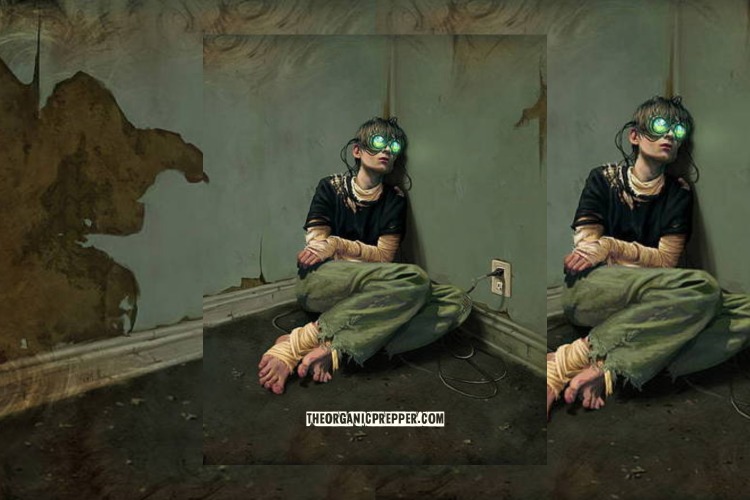If you're new here, you may want to subscribe to my RSS feed. Thanks for visiting!
Valve, the company behind Life and Counter-Strike, has just announced that the video games giant is ushering humanity into a Brave New World. How so? By merely including new technologies called brain-computer interfaces in its games.
BCIs will work on our feelings by adjusting the game accordingly
The head of Valve, Gabe Newell, has stated that the future of video games will involve “Brain-computer interfaces.” Newell added that BCIs would soon create superior experiences to those we currently perceive through our eyes and ears.
Newell said he envisions the gaming devices detecting a gamer’s emotions and then adjusting the settings to modify the player’s mood. For example, increasing the difficulty level when the player is getting bored.
Valve is currently developing its own BCIs and working on “modified VR head straps” that developers can use to experiment with signals coming from the brain. “If you’re a software developer in 2022 who doesn’t have one of these in your test lab, you’re making a silly mistake,” Newell said.
VR headsets will collect data by reading our brain signals
Valve is working with OpenBCI headsets. OpenBCI unveiled a headset design back in November that it calls Galea. It is designed to work alongside VR headsets like Valve’s Index.
Subscribe to our newsletter
Trying to figure out how to stock up while prices keep climbing? We can help with our free guide and newsletter!

“We’re working on an open-source project so that everybody can have high-resolution [brain signal] read technologies built into headsets, in a bunch of different modalities,” Newell added.
“Software developers for interactive experience[s] — you’ll be absolutely using one of these modified VR head straps to be doing that routinely — simply because there’s too much useful data,” said Newell.
The data collected by the head straps would consist of readings from the players’ brains and bodies. The data would essentially tell if the player is excited, surprised, bored, sad, afraid, or amused and other emotions. The modified head strap will then use the information to improve “immersion and personalize what happens during games.”
The world will seem flat and colorless in comparison to the one created in your mind
Newell also discussed taking the brain-reading technology a step further and creating a situation to send signals to people’s minds. (Such as changing their feelings and delivering better visuals during games.)
 “You’re used to experiencing the world through eyes,” Newell said, “but eyes were created by this low-cost bidder that didn’t care about failure rates and RMAs, and if it got broken, there was no way to repair anything effectively, which totally makes sense from an evolutionary perspective, but is not at all reflective of consumer preferences.”
“You’re used to experiencing the world through eyes,” Newell said, “but eyes were created by this low-cost bidder that didn’t care about failure rates and RMAs, and if it got broken, there was no way to repair anything effectively, which totally makes sense from an evolutionary perspective, but is not at all reflective of consumer preferences.”
“So the visual experience, the visual fidelity we’ll be able to create — the real world will stop being the metric that we apply to the best possible visual fidelity.
“Where it gets weird is when who you are becomes editable through a BCI.” ~ Gabe Newell
Typically your average human accepts their feelings to be how they truly feel. Newell claims that BCIs will allow for an edit of these feelings digitally.
“One of the early applications I expect we’ll see is improved sleep — sleep will become an app that you run where you say, ‘Oh, I need this much sleep, I need this much REM,'” he said.
Newell also claims that another benefit could be the reduction or complete removal of unwanted feelings or brain conditions.
Doesn’t something good come from this technology?
Newell and Valve are working on something beyond merely the improvement of the video game experience. There is now a significant bleed over in the research conducted by Newell’s team and the prosthetics and neuroscience industries.
Valve is trading research for expertise, contributing to projects developing synthetic body parts.
“This is what we’re contributing to this particular research project,” he said, “and because of that, we get access to leaders in the neuroscience field who teach us a lot about the neuroscience side.”
Are we equipped to experience things we have never experienced?
Newell briefly mentioned some potential negatives to the technology. For example, he said how BCIs could cause people to experience physical pain, even pain beyond their physical body.
“You could make people think they [are] hurt by injuring their tool, which is a complicated topic in and of itself,” he said.
From the TVNZ article:
Game developers might harness that function to make a player feel the pain of the character they are playing as when they are injured — perhaps to a lesser degree.
Like any other form of technology, Newell says there’s a degree of trust in using it and that not everyone will feel comfortable with connecting their brain to a computer.
He says no one will be forced to do anything they don’t want to do, and that people will likely follow others if they have good experiences, likening BCI technology to cellular phones.
“People are going to decide for themselves if they want to do it. Nobody makes people use a phone,” Newell said.
“I’m not saying that everybody is going to love and insist that they have a brain-computer interface. I’m just saying each person is going to decide for themselves whether or not there’s an interesting combination of feature, functionality, and price.”
But Newell warned that BCIs come with one other significant risk. He says, “Nobody wants to say, ‘Remember Bob? Remember when Bob got hacked by the Russian malware? Yeah, that sucked. Is he still running naked through the forests?'”
Is this just another step in separating us from ourselves?
The truth is we will continue to be told to ignore the implications for this type of technology and the direction in which we are heading. Because, of course, they ARE developing prosthetics, and this is an advance in scientific discovery. Still, one step forward by an agenda and a plan created long ago only brings us that much closer to losing our ability to remember.
About Robert
Robert Wheeler has been quietly researching world events for two decades. After witnessing the global network of NGOs and several ‘Revolutions’ they engineered in a number of different countries, Wheeler began analyzing current events through these lenses.
















15 Responses
the only way to win is not to play.
“Doesn’t something good come from this technology?”
absolutely. just not for YOU.
https://external-content.duckduckgo.com/iu/?u=https%3A%2F%2Fi.ytimg.com%2Fvi%2FsF7Kh-4GgnQ%2Fmaxresdefault.jpg&f=1&nofb=1
Hmmm. Plug into the Matrix? No thanks
A bit speculative, don’t you think? All supposition + no evidence = conspiracy theory. This may well end up as one of those technologies that looked cool on paper but just didn’t pan out. With all respect, I’m glad I don’t live in your world, Mr. Wheeler.
Just read a short story by Authur C. Clarke (The Lion of Comarre). The premise is a man has made a machine interface with humans to give them the more reality than reality experience.
Some choose this perfect Utopia/virtual(the story was published in 1949, so virtual reality was still the stuff of SF, likely not even in lexicon yet) existence. They believe in it so much, to pull them out of it, some go mad, thinking actual reality is a fake, and the Utopia/virtual one the real one.
Others are aware, but insist reality has not fulfilled them as expected and choose the Utopia/virtual one, gladly.
I think there maybe a analogy there about the average American and “Reality” TV.
While the technology in the article may still seem far fetched, smartphones, drones, Cat Scans, MRI, AI and more, were all once only in the realm of SF, but now a reality.
If we pay attention, we will find we learn more from science fiction writers than we do from “regular” writers.
Was proven true so far.
-Not So Free,
Well said.
Love the implanted computers in Elizabeth Moon’s Vatta’s War series. But wouldn’t use one in today’s world.
Can you sum up for those of us who have not read the series?
I have heard of Elizabeth Moon.
1stMarineJarHead you’ll like this, Moon was a Marine for 3 years. Not sure but I saw something that made me think she might have been an officer.
The series was written in the early 2000s and finished in 2005 or 2006. So think what computers were like then. It is sf, so it is set in space. The main character is probably about 21 or 22 in the beginning and becomes a trading/cargo ship captain right off. Her family owns the company. She (all of Moon’s lead characters are women) was recently discharged from her planet’s military academy, with only a few months till graduation, and was the top student.
The implant requires some space to be made inside the head but also leaves a noticeable bulge in the side of the head. So I’m thinking probably the size of 1 or 2 9 volt batteries. You can raise the skin flap for aux power and external data connection, but recharging its battery is not mentioned. When first installed a “docking station” is installed, so the implant can be changed out.
Start with a modern cell phone with all the bells and whistles. A database is included. Data can be loaded from outside or downloaded to the outside. Facial recognition pulls up data on the person viewed. Think any question and if it’s in the database you’ll get an answer. As she is captain of the ship all manuals on every ship system are available in the database. All legal info on interstellar trading/cargo is included as are all details on her company’s policy. So, imagine every book you might ever need stored, indexed and searchable in your head. Everything prepper and always with you.
Records all your actions and thoughts. Can replay conversations, anything you’ve seen, etc. IE, a perfect memory and searchable. Other people’s memories too, if your using their implant.
Monitors all your bodily functions. Think of the most extensive medical exam you have ever had with blood and urine tests, etc, results available to you and software in your implant, all the time. With the right software can adjust your mood and emotions, when needed, so you can think clearly in stressful situations, such as combat, business, etc. A cure for many mental problems, especially PTSD, which she had when her ship exploded in combat and only she and one other survived. Her cousin was kidnaped one time and restrained only with drugs and not tied up. He had just finished an advanced biochemistry course and still had all the files in his implant and he was able to stimulate chemical reactions in his body and neutralized the drugs and escape. A little farfetched.
They have instantaneous interstellar communications. She accidently downloads the software to give her that ability. It does require external power. Also a little farfetched.
Sounds like Brave New World.
“‘game’? this wasn’t meant to be a game! never!”
Creepy!! I can just see so many ways this could be abused. ????
“He says no one will be forced to do anything they don’t want to do, and that people will likely follow others if they have good experiences”
here kitty kitty, want the nice treat?
See Red Dwarf “Better Than Life”
this was bit too hippie for me